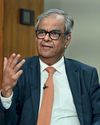Two high-profile RBI exits – Urjit Patel and Viral Acharya – have again opened the debate on the central bank’s independence.

Governments that do not respect central bank independence will sooner or later incur the wrath of financial markets." This warning by Reserve Bank of India (RBI) Deputy Governor Viral Acharya in October last year seems to have gone unheeded. Acharya is the latest key RBI official to have quit (six months before his term was to end) in the middle of tumultuous events at the RBI that have, over the past year, seen the government demand additional surplus capital, threatening to use its special powers to direct the RBI on matters such as restructuring MSME loans, releasing weak banks from tight regulatory control and Urjit Patel resigning as governor in haste citing personal reasons.
That's not all. The siege in recent months has included a bank dragging the RBI to court over stake-reduction guidelines and a quasi-judicial body like the National Company Law Appellate Tribunal (NCLAT) encroaching into its powers, saying banks should not declare the IL&FS account as a non-performing asset (NPA), and the biggest of all, the Supreme Court setting aside the RBI circular that laid down rules for one-day default by big companies and, in a separate case, asking it to disclose information about its annual inspection of banks under the Right to Information (RTI) Act.
Even as the challenges continue, the RBI, under the new Governor, Shaktikanta Das, who retired as Economic Affairs Secretary two years ago, seems to be more accommodating to the government's concerns than under the previous two incumbents - Urjit Patel and Raghuram Rajan - when it comes to easing interest rates, paying higher dividends, making life easier for weak banks and restructuring package for stressed MSMEs.
Diese Geschichte stammt aus der July 28, 2019-Ausgabe von Business Today.
Starten Sie Ihre 7-tägige kostenlose Testversion von Magzter GOLD, um auf Tausende kuratierte Premium-Storys sowie über 8.000 Zeitschriften und Zeitungen zuzugreifen.
Bereits Abonnent ? Anmelden
Diese Geschichte stammt aus der July 28, 2019-Ausgabe von Business Today.
Starten Sie Ihre 7-tägige kostenlose Testversion von Magzter GOLD, um auf Tausende kuratierte Premium-Storys sowie über 8.000 Zeitschriften und Zeitungen zuzugreifen.
Bereits Abonnent? Anmelden

"Inaction is worse than mistakes"
What was the problem you were grappling with?

TEEING OFF WITH TITANS
BUSINESS TODAY GOLF RESUMES ITS STORIED JOURNEY WITH THE 2024-25 SEASON OPENER IN DELHI-NCR. THERE ARE SIX MORE CITIES TO COME

AI FOOT FORWARD
THE WHO'S WHO OF THE AI WORLD GATHERED AT THE TAJ MAHAL PALACE IN MUMBAI TO DELIBERATE THE TRANSFORMATIVE IMPACT OF AI ON INNOVATION, INDUSTRIES, AND EVERYDAY LIFE.

Decolonising the Walls
ART START-UP MAAZI MERCHANT IS ON A MISSION TO BRING INDIA'S FORGOTTEN ART BACK HOME

"I'm bringing Kotak under one narrative, one strategy, one umbrella”
Ashok Vaswani is a global banker who spent most of his career overseas at institutions like Citi Group and Barclays, among others.

CHOOSING THE CHAMPIONS
The insights and methodology behind the BT-KPMG India's Best Banks and NBFCs Survey 2023-24.

'INDIA IS AT AN EXTREMELY SWEET SPOT'
The jury members of the BT-KPMG Survey of India's Best Banks and NBFCs discuss developments in the banking sector and more

FROM CRISIS TO TRIUMPH
Dinesh Kumar Khara stewarded SBI through multiple challenges during his tenure, while ensuring that profits tripled, productivity soared, and the bank consolidated its global standing

AT A CROSSROADS
BANKS ARE FACING CHALLENGES ON BOTH SIDES OF THE BALANCE SHEET-ASSETS AS WELL AS LIABILITIES-WHICH ARE PUTTING PRESSURE ON MARGINS.

EXPANSIVE VISION
Bajaj Finance, an outlier in terms of digitisation, faces stiff competition. But it continues to expand its reach